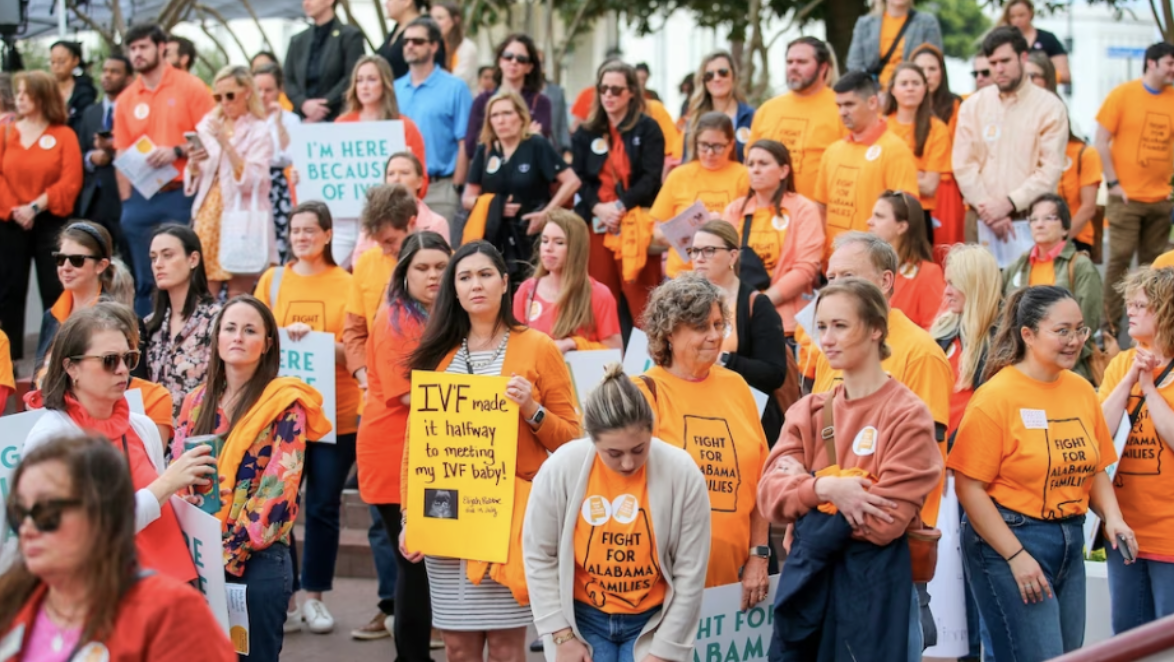About 2% of all babies born in the US are conceived through In Vitro Fertilization ₁ (IVF). Nevertheless, a recently proposed law from Alabama which states that life begins at conception has caused an uproar as many fear the legislative change may lead to unprecedented consequences for families.
This new development stems from two lawsuits that arose when three couples lost their embryos at a fertility clinic in 2020 due to their mishandling by a fellow patient. The patient had wandered into storage and picked up a vessel of embryos frozen at sub-zero temperatures. The patient then dropped the vessel when it burnt their hand, destroying the container and causing the embryos to no longer be viable. Seeking justice, the couples sued under Alabama’s Wrongful Death of a Minor Act, which, at the time, didn’t explicitly include embryos from IVF.
The case was initially dismissed by a lower court, stating that embryos weren’t legally considered people; rather, they were properties. However, the couples later appealed to the state’s highest court. On February 16th, the Alabama Supreme Court ruled in favor of the couples, deeming frozen embryos as “children” under the law. The court wrote: “Unborn children are ‘children’ … without exception based on developmental stage, physical location, or any other ancillary characteristics.” (Supreme Court of Alabama, 2024) This ruling stressed that the statute encompassed all unborn children regardless of their stage of development, thus granting them personhood.
While the ruling doesn’t directly impact the legality of IVF in Alabama, it does introduce uncertainty regarding the treatment and storage of embryos. Medical experts and critics have expressed their concern over the future consequences of this ruling, one being the potential limitations on fertility options. Some fear medical providers may be discouraged from providing IVF treatments due to a fear of liability each time a round of treatment does not lead to a successful pregnancy. Already, three of the eight fertility clinics in Alabama have paused IVF treatment in the wake of the ruling for fear of legal risk. The new statute could cause liability costs to skyrocket, making treatment unavailable to families in need. Furthermore, families would be forced to pay storage fees for unwanted embryos that cannot be discarded. In other words, the ruling does not criminalize IVF, but it does make the procedure more risky and inaccessible. Some of the fallout can already be seen, as families rush to transfer their frozen embryos out of Alabama due to fear of what happens next.
Additionally, this decision is tightly linked with the broader US abortion debate, reflecting the ongoing battle over reproductive rights. The case amplifies discussions on when personhood begins, but also diverges from typical abortion discourse. Nuanced perspectives can be found within both sides of the argument. Some argue that many potential lives are lost during the process of attempting to conceive the child, and successful pregnancies are not worth the loss of other embryos. Others argue that the procedure is one that grants those who face difficulties getting pregnant the ability to start a family and fulfill their dreams. There has also been growing concern that other states may follow Alabama’s lead, causing the ruling’s ramifications to extend beyond state lines and influencing policies across the US.
All in all, the ruling has caused reverberations on a national level, as doctors warn of the importance of separating healthcare and politics, along with amplifying the voices of patients. Cater Durham, a patient with embryos left over from her last IVF treatment, states, “I feel like it should be my choice if I want to keep it, donate it, discard it. Whatever I decide I want to do, it should be my choice, not the state of Alabama’s.
1. IVF is a medical procedure used to help parents conceive a baby when natural conception is difficult. It involves combining an egg with sperm outside of the body in a petri dish to create an embryo. Once the embryo is fertilized, it is transferred into the uterus, where it may develop into a pregnancy.
El-Bawab , N., & Kekatos, M. (2024, February 23). Alabama women describe heartbreak over some IVF treatments stopping following court ruling on embryos. ABC News. https://abcnews.go.com/US/alabama-women-describe-heartbreak-ivf-treatments-stopping-court/story?id=107461069
Epstein, K. (2024, February 22). Major Alabama hospital pauses IVF after court rules frozen embryos are children. Www.bbc.com. https://www.bbc.com/news/world-us-canada-68366337
In Vitro Fertilization (IVF). (n.d.). Www.hopkinsmedicine.org. https://www.hopkinsmedicine.org/gynecology-obstetrics/specialty-areas/fertility-center/infertility-services/ivf
Kallingal, E. W., Dianne Gallagher, Mallika. (2024, February 23). Alabama IVF ruling: Alabama attorney general’s office says it has “no intention” to prosecute IVF families, providers. CNN. https://edition.cnn.com/2024/02/23/us/alabama-ivf-embryos-supreme-court-ruling-legislation/index.htmlSchulze,
E., & Haslett, C. (2024, February 29). Alabama Legislature passes bill to ensure IVF access after court ruled embryos are children. ABC News. https://abcnews.go.com/Politics/alabama-house-passes-bill-ensure-ivf-access-after/story?id=107689399

